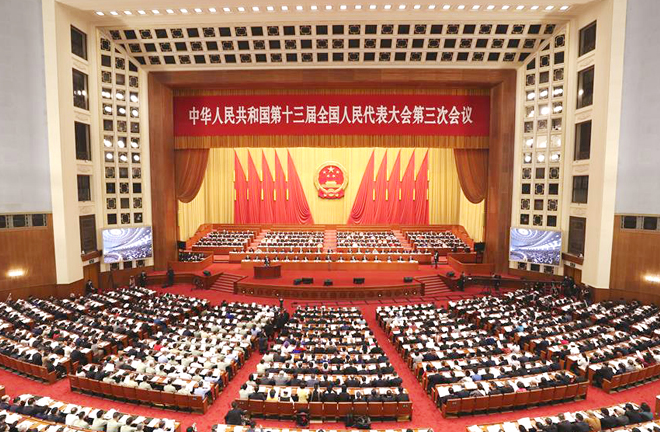Academics offer proposals at China’s annual Two Sessions

The third session of the 13th National People’s Congress (NPC) opens in the Great Hall of the People in Beijing, May 22. Photo: Yao Dawei/XINHUA
China on May 21 raised the curtain for its annual political high season after an over-two-month postponement now that the country has turned the tide on the COVID-19 epidemic.
The top political advisory body started its annual session Thursday afternoon in Beijing, kicking off the Two Sessions, a major event in China’s political calendar that also includes the annual gathering of the national legislature, which opened on May 22.
Submitting proposals to the National People’s Congress (NPC) and the Chinese People’s Political Consultative Conference (CPPCC) is an important way for deputies and members to perform duties and participate in politics. In 2019, departments of the State Council took the lead in handling 7,162 suggestions by NPC deputies and 3,281 proposals by CPPCC National Committee members, accounting for 87.8% and 85% of the total suggestions and proposals submitted to the Two Sessions, respectively. All of them have been completed on time and with good feedback. Many of these proposals come from representatives of the social sciences community.
A member of the CPPCC National Committee, Yuan Jing, a research fellow from the Institute of Archaeology at the Chinese Academy of Social Sciences, made suggestions on protecting and making use of cultural heritage at last year’s Two Sessions. In face of the uneven distribution and preservation of cultural relics related to science and technology in research or teaching institutions in various places, Yuan proposed building and improving national specimen banks and databases for special cultural relics. A timetable was set up to achieve this through exchanging ideas with the staff of relevant departments of the National Cultural Heritage Administration. At the end of 2019, the National Cultural Heritage Administration announced plans to build a national library for cultural relics related to science and technology.
Zhao Guoxiang, an NPC deputy and Party secretary of Henan Normal University, said that after he put forward suggestions on strengthening psychological services at the community level, China’s National Health Commission and relevant departments began to promote related work. In response to the COVID-19 pandemic, the State Council’s joint prevention and control mechanism coordinated relevant departments in a scientific way and promoted orderly psychological counseling and social work services, effectively eliminating the panic and anxiety of the public.
The Two Sessions are a concentrated display of consultative democracy and democratic consultation. Xia Fei, a member of the CPPCC National Committee and president of Guangxi University of Finance and Economics, said that both consultative democracy and democratic consultation emphasize effective dialogue, communication and consultation on national strategies and policies, achieving consensus through in-depth and repeated consultations to provide scientific and democratic procedures and bases for decision-making.
Social scientists themselves have an important responsibility to provide suggestions for national development, said Huang Ping, a member of the CPPCC National Committee and executive vice president of the Chinese Institute of Hong Kong.
“As a member of the 13th CPPCC National Committee, I am also a member of the academic circle. Given my profession, I will actively reflect the voices and demands of theoretical and academic circles, conduct in-depth investigation and research, and submit high-quality proposals,” said Han Qingxiang, a professor at the Party School of the Central Committee of the CPC.
edited by JIANG HONG

 PRINT
PRINT CLOSE
CLOSE